Project management is prevalent across all industries, and business leaders recognize the need for project management training and skill development among their workforce. Although projects may vary in scope and across industries, understanding how to manage projects can add value to the organization through better resource utilization and mitigating risk.
Dr. Juanita Woods, Assistant Professor of Management, describes project management as, “Another tool in a manager’s tool box to successfully engage in the company’s work. A person doesn’t have to be labeled as a Project Manager to manage projects within an organization.”
In fact, employees may not realize that they are managing a project. Have you ever launched a new product or service line, implemented a new software system, evaluated employees, or established a new customer service department. These are all examples of “projects” that can be achieved using the standards of project management.
Dr. Woods explains that specific goals and objectives should be outlined and through careful planning, organization, and management of resources, the organization can achieve successful project completion. “By properly defining the project and applying the project management standards, you can increase productivity and efficiency in your organization. Employees will feel empowered to manage their work more effectively and understand how their contribution ties back to the goals of the business”, states Dr. Woods.
Woods also recommends visiting the Project Management Institute website at www.PMI.org to learn more about the tools available for the five different phases of project management: initiating, planning, executing, controlling, and closing. Learning how to apply the proper tools during the different phases of the project can help organizations meet their goals within their desired timeline and budget.







